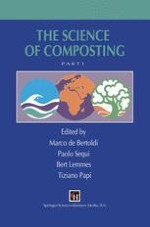1996 | OriginalPaper | Chapter
The Role of Composting in Sustainable Agriculture
Author : Paolo Sequi
Published in: The Science of Composting
Publisher: Springer Netherlands
Included in: Professional Book Archive
Activate our intelligent search to find suitable subject content or patents.
Select sections of text to find matching patents with Artificial Intelligence. powered by
Select sections of text to find additional relevant content using AI-assisted search. powered by
Incineration, landfill and recycling are the three main strategies to face the problem of waste disposal, and they may co-exist. However, it is essential to encourage recycling, the only sustainable practice among the three above cited which avoids the existence itself of wastes by transforming possible waste materials in a series of products. Composting, as sustainable transformation of potential wastes in organic fertilizers, tunes up with sustainable agriculture, and must be optimized and encouraged. The importance of the use of compost in agriculture is a commonplace, and does not correspond to reality, particularly if rules and technical parameters for its application are not given by the proper professional and institutional competence, as is often happening. The use of compost in agriculture has much more than the importance of the application of an amendment to the soil. The three requisites needed in order that agriculture can be considered sustainable are discussed, and the use of compost is shown to enhance sustainability, not only of the agricultural activity, but in a more general context. Sustainable agriculture, and the use of compost in agriculture can be considered as essential activities for a sustainable society.
